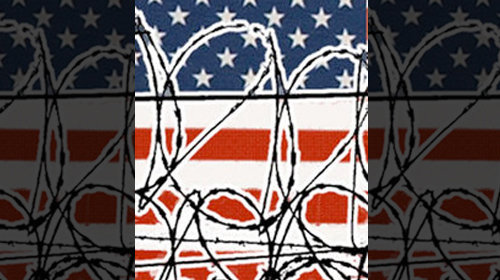ProPublica: “Can the government declare anything a Guantanamo detainee does or says automatically classified?”


Earlier this week, ProPublica published an article discussing the government’s attempts to censor the statements of the defendants in the 9/11 Guantanamo military commission trials. The article’s well worth reading because it discusses in detail the government’s arguments for censorship, as well as legal challenges brought by the ACLU, media organizations, and one of the 9/11 defendants’ lawyers.
As ProPublic reports, the government has asked the military commissions judge for an order finding that “any and all statements” by the five 9/11 defendants are “presumptively classified,” including their own accounts of their mistreatment and torture at the hands of the U.S. government. “The government says the defendants’ accounts, if made public without review by a government authority, could reveal details of the CIA’s detention and interrogation efforts,” – despite the fact that much is already known about the CIA’s illegal conduct, including from the infamous “torture memos” which were released by President Obama in 2009 in response to an ACLU Freedom of Information Act lawsuit.
How will the government censor detainees’ accounts in practice? As ProPublica says, “The government’s order mandates that the court proceedings, which are transmitted via closed circuit TV to media and other observers in viewing rooms in the U.S., get a forty-second delay to allow for the blotting out of any sensitive information revealed by the defendants.”
In May, we filed a motion challenging the government’s proposed censorship order. As Hina Shamsi, ACLU National Security Project director stated in a statement we issued at the time, “Our nation’s civilian and military courts have historically recognized that the truth, no matter how ugly, is better aired than concealed from the public. The most important terrorism trial of our time should not be an exception to the rule of public access as its legitimacy depends in part on its transparency.”
Regarding our motion, ProPublica reports:
The ACLU’s motion takes issue with the idea that the government has declared detainees’ “personal knowledge of their detention and treatment in U.S. custody” classified. Their exposure to classified information was forced upon them, the ACLU states, in CIA detention and interrogation programs that are now outlawed.
The ACLU argues that an executive order on classification signed by Obama in 2009 says in part that, in order to be properly classified, information must be “under the control of the United States Government.” The ACLU’s brief challenges whether that authority could be extended “categorically to human beings under the government’s control.” [emphasis in original].
The ACLU also argues that the detainees were not in any kind of contractual relationship which would make them liable for the classified information they were exposed to.
In a response to the ACLU’s brief, the government reiterated that certain elements of the CIA program are still properly classified and that this is the most practical way to handle that sensitive information. The government claims that the forty-second delay is a narrow measure that satisfies the public’s right of access, pointing to coverage of the arraignment in May. Eliminating it, as the ACLU requests, would force the government to “predict the accused’s possible future behavior.” (The ACLU counters that any information a detainee might reveal wouldn’t require government confirmation, and would be the same as previous accounts of their detention in the press and Red Cross reports.)
We hope to argue our challenge to the government’s censorship at the next hearing in the case in August.
Stay tuned.
Learn more about military commissions: Sign up for breaking news alerts, follow us on Twitter, and like us on Facebook.



